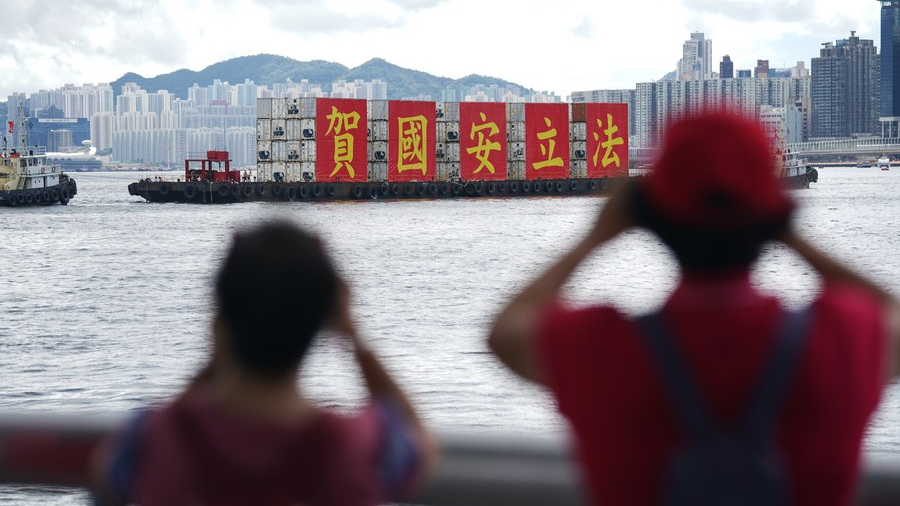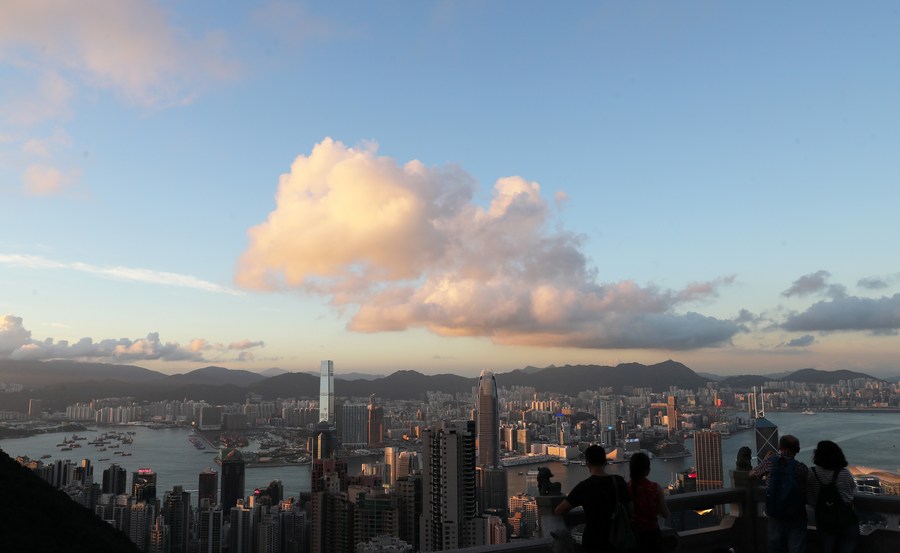
A ship carrying the slogan of "celebrating the passage of the Law of the People's Republic of China on Safeguarding National Security in the Hong Kong Special Administrative Region (HKSAR)" sails in Victoria Harbor in Hong Kong, south China, July 1, 2020. /Xinhua
A ship carrying the slogan of "celebrating the passage of the Law of the People's Republic of China on Safeguarding National Security in the Hong Kong Special Administrative Region (HKSAR)" sails in Victoria Harbor in Hong Kong, south China, July 1, 2020. /Xinhua
Editor's note: Tom Fowdy is a British political and international relations analyst and a graduate of Durham and Oxford universities. He writes on topics pertaining to China, the DPRK, Britain and the U.S. The article reflects the author's opinions, and not necessarily the views of CGTN.
On July 6 Hong Kong's Hang Seng Index Stock Exchange and the Shanghai Composite surged. The special administrative region's market officially entered bull market territory booming by 3.8 percent, clawing back three months'-worth of turbulence over political uncertainty and COVID-19. Similarly, the Shanghai Stock Exchange Composite Index surged by 5.7 percent and rejuvenated the market to its highest position since January 2018, reversing all of the losses imposed on it by the subsequent trade disputes with the U.S. which came later that year.
The surges come despite renewed tensions between China and Western countries, of which the latter's media has attempted to push a narrative that the national security law will be a death knell for the city's economy and business.
Quite obviously, investors on the ground disagree. The belief that the law has undermined the attractiveness of Hong Kong as a whole is not based in fact whatsoever, and on the contrary the renewed stability and certainty in the territory has ensured an end to a year of non-stop chaos.
On the mainland, stocks similarly surged as so-called "decoupling" has not stifled inbound Western investment, and companies such as the Semiconductor Manufacturing International Corporation (SMIC) are booming.
When the national security law was passed, the Western media responded with a barrage of articles claiming that the new legislation would stifle and undermine the attractiveness of the city as a global business and financial center. Numerous media outlets unreservedly made the claim that Hong Kong was "over" and proceeded to quote leading U.S.-funded activists as a go-to source on the city's economic future. Reuters for one quoted former Demosisto leader Nathan Law, who claimed that financial services were leaving the city. In addition, as highlighted before British media have constantly exaggerated the potential impact of the British National Overseas Passport Pledge.
These claims are not based on hard economic facts or even a meaningful comprehension as to how businesses work, but ideological bias and complacency in the erroneous assumption that investors would prefer liberal political values over interest incentives, and that somehow businesses would naturally prefer the city being in a perpetual state of disorder and chaos, which to the West was ethically "correct" rather than being in a state of stability, confidence or certainty. This doesn't make any sense, and it ignores the fact that capital was in fact leaving the city because of the riots last year and not because of the national security law, and that the territory was already in recession.

People view the scenery in Hong Kong, south China, June 11, 2020. /Xinhua
People view the scenery in Hong Kong, south China, June 11, 2020. /Xinhua
As a result, it is no surprise that as the law has been implemented; the city's markets have begun to bounce back fiercely. The Hang Seng is just one indicator; the territory's real estate markets have also surged again, with many property firms contributing to the stock boom.
This coincides with the context that China's own economic recovery as a whole is accelerating as COVID-19 is overcome. As a Wall Street Journal subheading notes, private economic surveys "suggest that Beijing's firm handling of pandemic has restored enough confidence to allow recovery to gather momentum" and in turn, positive GDP growth is back.
Fears of tensions with the West and decoupling may remain as headwinds, but have in fact accelerated some of the trends in these markets than to diminish them. Met with growing hostility in the U.S., more Chinese companies are hedging their bets to list in Hong Kong.
Another example is the astonishing ascendency of SMIC. Buoyed by America's technology war and attacks on Huawei, the firm has gained enormous market ground as it targets investment in closing the gap on U.S. capabilities. Already booming on Hong Kong markets with a 21 percent increase on July 6, the semiconductor firm is set for an initial public offering of 1.6 billion shares to mainland investors today which are set to raise up to 7.5 billion U.S. dollars. As management strategist Kenny Wen told the South China Morning Post: "with a new round of capital, the company can increase capital expenditures for research and development."
As a whole, markets are not doubtful about the impact of Hong Kong's new national security law, but contrary to Western ideological assumptions, are placing renewed confidence in it. The Western media attempted to whip up a climate of fear and hysteria which forecast doom for the city. This has no practical truth in it whatsoever.
Instead, an environment of stability and certainty in the territory, combined with successful containment of COVID-19 and a national rebound are giving investors new certainty in Hong Kong and are driving forwards a bull markets. This coincides with an equally positive picture on the mainland, whereby tech companies are quickly becoming a huge opportunity.
(If you want to contribute and have specific expertise, please contact us at opinions@cgtn.com.)